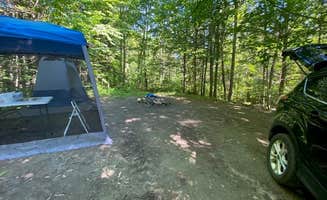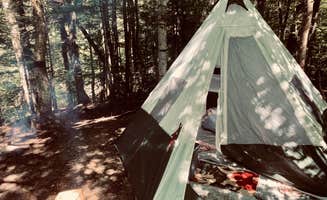Dispersed camping near Auburn, Maine offers primitive sites within the White Mountain National Forest area, requiring self-sufficiency and proper waste management. Access roads vary from well-maintained dirt roads to rougher forest roads, with conditions changing seasonally. Most dispersed sites in this region feature simple clearings with established fire rings and no facilities, allowing campers to experience Maine's western forest landscape in relative solitude.
What to do
Hiking from campsites: The area around Hogan Road Pulloff near Appalachian Trail provides direct access to scenic trails. Camper Dominique F. notes, "About 1km (.6 miles) of gravel road, easy enough for a big road bike, but don't go any further as it gets rough." This location serves as a convenient base for exploring segments of the famous Appalachian Trail.
Water activities: Many sites allow access to rivers and streams for swimming and fishing. At White Mountains Camping on Little Larry Road, Jason R. mentions there's a "Creek runs through road near sites good for getting water to filter or washing. Trailhead at end of road." The numerous waterways provide opportunities for trout fishing, especially in spring and early summer.
Stargazing: The minimal light pollution in these areas creates excellent night sky viewing conditions. Jason R. specifically mentions "Great stars" at White Mountains Camping on Little Larry Road, making it worthwhile to bring along binoculars or a telescope during clear nights.
What campers like
Site privacy: The spacing between sites at dispersed camping areas provides a sense of seclusion. Amanda B. describes Town Hall Road Dispersed sites as "huge, beautiful campsites in the heavily wooded Evans Notch section of The White Mountains National Forest. It's easy to forget there are other people camping on other sites because they're so far apart."
Natural surroundings: The forested environment creates an immersive outdoor experience. Josie W. explains why she enjoyed Town Hall Road: "We loved this spot. There were plenty of sites to choose from and most (not all) had access to the river as well as a fire ring. Sites were on a dirt road, but it was quiet for the most part."
Water proximity: Many campers appreciate the stream and river access available at various sites. Erin H. describes her experience: "Down toward the river there was plenty of open space so we pitched there and built a fire pit. It was one of our favorite camp spots yet! Very peaceful, beautiful and quiet. There are trout in the river."
What you should know
Road conditions: Forest roads accessing dispersed sites can be challenging depending on recent weather. Bob G. shares about his journey to Hogan Road Pulloff near Appalachian Trail: "The road was not as bad as I anticipated. There was room for my Jeep Grand Cherokee towing a squaredrop camper to pass the very few oncoming vehicles we encountered." However, conditions vary seasonally.
Navigation challenges: GPS systems may not always provide accurate directions to these remote areas. Mark M. cautions, "GPS initially took me on the wrong road - make sure you stay on Town Hall Rd no matter what the GPS says." It's advisable to have offline maps or written directions as backup.
Weather considerations: Sites can handle various weather conditions differently. Rowan E. found that during rainy conditions, "We went during a pouring rain storm and our site remained relatively dry. We even enjoyed a small fire the next day."
Tips for camping with families
Site selection for kids: Look for sites with natural features that provide entertainment. Alex S. describes finding the perfect spot at Town Hall Road: "We found our spot which had some river access and it was gorgeous. It had an above and below spot which hosted our two tents."
Arrival timing: Plan to arrive early on weekends to secure family-friendly sites. Candice J. notes that at Town Hall Road there are "6-8 spots some big enough for med. camper," suggesting early arrival is important during peak times since options are limited.
Bring portable amenities: No facilities means planning ahead for comfort items. Amanda B. shares this insight from her experience at White Mountains Camping on Little Larry Road: "The only thing I regret not bringing with me is a table to put my camp stove on."
Tips from RVers
Size restrictions: Most dispersed sites in this region accommodate only small to medium-sized rigs. Bob G. explains, "There is a good mix of tent and small/medium camper sites. Many of the sites are right on the side of the road." Larger RVs and fifth wheels will have difficulty finding suitable spots.
Connectivity considerations: Working remotely while camping requires planning and potentially specialized equipment. Kevin H. found at White Mountains Camping: "Just enough t-mobile / starlink signal to watch streaming and message, but wouldn't be enough for remote work so we went to the White Mountain National Forest Picnic area off the main road about 5 minutes away and had great signal."
Power options: Rebecca B. notes the limitations for solar-dependent campers at Town Hall Road: "If you need solar or starlink, there's only 1 or 2 viable spots. We were lucky to snag on one a Monday afternoon (last site before turnaround on FR38) and stayed all week." Plan for alternate power sources in heavily wooded sites.




